 |
 27th December 1998 |
Front Page| |
Peace is still elusive
Jaffna had been slowly returning to normalcy since the local government
election of January. The election, held with a number of journalists, foreign
correspondents and observers in attendance, was chalked up as a success
for the government (for being able to conduct it relatively peacefully).
A second Mayor was chosen after Yogeswaran's death, but he too was not
allowed to continue for long. Come September 11 and a bomb blast in the
Municipal Council killed P. Sivapalan, the Mayor (and many others including
Jaffna's military top brass). With these brutal assassinations and the ban in civil air travel following the September 29 disappearance of an ill-fated Lionair aircraft carrying civilians to Colombo, the facade of normalcy evaporated, leaving the town struggling again, cut off from the "safe south", torn and bruised, in a never-ending war. 50th year of Independence. The year began with the government preparing
for major celebrations in the historic city of Kandy. The entire city bustled.
Old paint- work was being touched up. The roads mended and trees trimmed.
But in the wee hours of January 25, a lorry packed with explosives managed
to drive through the flimsy security barriers erected around the 400-year-old
Dalada Maligawa and explode at its outer gates, causing immense damage
to what is considered a World Heritage Site by UNESCO. Independence celebrations shifted to Kotte and was largely kept private, away from the public eye. Prince Charles, Britain's heir to the throne was an honoured guest, amidst many an opinion voiced over his "suitability" to be present at the country's commemoration of independence from British rule. Appropriately, Sri Lanka was host to the 10th SAARC Summit in late July.
The event was particularly important as it was the first meeting of India's
Atal Behari Vajpayee and Pakistan's Nawaz Shariff after the two countries
became contestants in a battle for nuclear supremacy in the region. The
summit was held amidst tight security in a tense city, but the seven Heads
of State did take a luncheon break on the sunny (rather windy at the time)
shores of Bentota. The stifling hand of a military censor clamped on the media once again in June, shutting the public eye on all matters regarding military offensives in the north. When the surprise LTTE attack on Kilinochchi on October 3 and 4, ended with over a thousand lives lost on both sides Friday, the public had to depend on heresay and the foreign media for information on their own country. Deputy Defence Minister Anuruddha Ratwatte had a close call when LTTE mortar shells fell just yards away, killing his bodyguard and three others in Oddusudan early this month. The General was leaving a kovil after a religious ceremony, shortly after the army took control of the small town on the road to the LTTE stronghold of Mullaitivu. Although there have been no major incidents in Colombo city since the suicide bomber opposite the Air Force headquarters (February) and the bomb at Maradana which killed many schoolchildren (March), the calm is uneasy, like the eye of the storm. Nervous city-dwellers wonder what and when next. Peace is yet an elusive promise. No talks and no military offensive since halting Jaya Sikurui early this month. Despite severe protests from the opposition and adverse media publicity, 40 percent of shares and management rights of AirLanka, the national carrier, was sold to Emirates, the Dubai-based airline Emirates who managed AirLanka since April this year has initiated a number of changes — one of which will be a complete overhaul of the airline's persona (corporate image). But since the takeover, its operations have been riddled with problems, ranging from flight delays and staff rebellion to mechanical failure. Harry Jayewardena, the controversial Chairman of AirLanka, quit a few weeks ago. A Goods and Services Tax (GST) was imposed on unwitting consumers by a government desperate for funds. The war has drained state coffers and the monies the state hoped to collect through never came. Instead, the new tax became a curse on the lips of the public already struggling under the burden of a skyrocketing cost of living. Women's rights became an issue as never before. Two gruesome incidents of rape and murder ignited the fire that drove hundreds of angered women onto the streets, demanding that the state offer more protection to women.
But there is still that silver lining. Or is it gold? Sri Lankan athletes did their country proud in the Asian Games bagging three gold medals in sprint events, breaking a 24-year hoodoo without a single gold. Damayanthi Dharsha returned to the country last week having established her might with the new Asian record for 200 metres. - (TD) |
||
 |
More Plus * Get into action at Club Horizon - Travel
Front Page| News/Comment| Editorial/Opinion| Business| Sports | Mirror Magazine |
|
 |
Please send your comments and suggestions on this web site to |
|
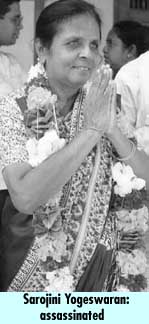 Sarojini
Yogeswaran abhorred the wall of security that kept her away from the common
man. This explains why she, and not her bodyguards, opened the door of
her residence to the two LTTE gunmen who mowed down Jaffna's newly-elected
Mayor on the morning of May 17.
Sarojini
Yogeswaran abhorred the wall of security that kept her away from the common
man. This explains why she, and not her bodyguards, opened the door of
her residence to the two LTTE gunmen who mowed down Jaffna's newly-elected
Mayor on the morning of May 17.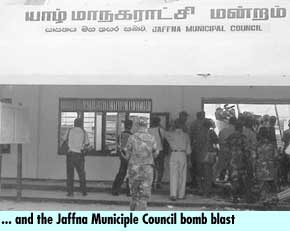
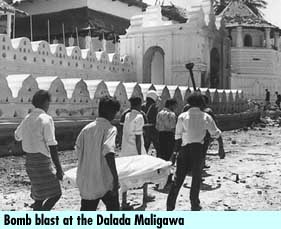
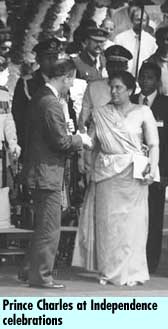
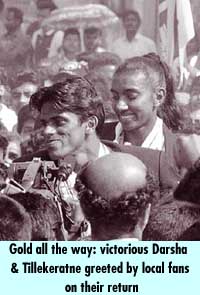 In
July, army personnel convicted of rape and murder of schoolgirl Krishanthi
Kumaraswamy were sentenced to death by the High Court. But that did not
deter the criminals of Crow Island in Mattakkuliya who abducted, raped
and killed Rita John, a new bride of Indian origin who was visiting her
parents-in-law in Colombo.
In
July, army personnel convicted of rape and murder of schoolgirl Krishanthi
Kumaraswamy were sentenced to death by the High Court. But that did not
deter the criminals of Crow Island in Mattakkuliya who abducted, raped
and killed Rita John, a new bride of Indian origin who was visiting her
parents-in-law in Colombo.